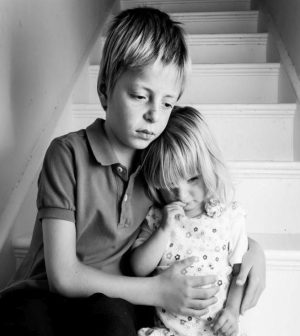- 10 Strategies to Overcome Insomnia
- Could Artificial Sweeteners Be Aging the Brain Faster?
- Techniques for Soothing Your Nervous System
- Does the Water in Your House Smell Funny? Here’s Why
- Can a Daily Dose of Apple Cider Vinegar Actually Aid Weight Loss?
- 6 Health Beverages That Can Actually Spike Your Blood Sugar
- Treatment Options for Social Anxiety Disorder
- Understanding the Connection Between Anxiety and Depression
- How Daily Prunes Can Influence Cholesterol and Inflammation
- When to Take B12 for Better Absorption and Energy
Abuse in Childhood May Shorten Adult Lives: Study

Child abuse and neglect can do significant and long-lasting damage, according to a six-decade review of British data.
The analysis of records dating to the late 1950s found that children who experienced physical or sexual abuse were more likely to die early as adults.
“Our work shows the long-lasting consequences that specific types of child abuse and neglect can have. The findings are especially important because these early-life adversities are not uncommon, affecting millions of people in the U.K.,” said first study author Dr. Nina Rogers. She is an epidemiologist at the University of Cambridge, who led the study while at University College London.
The analysis included more than 9,300 people born in 1958 who were part of a nationwide study of child development in the United Kingdom.
When they were 7 and 11 years of age, the participants’ mothers and teachers were asked questions intended to indicate if youngsters showed signs of neglect.
Then, at 45 years of age, the participants were asked if they had ever experienced sexual, physical or psychological abuse, or witnessed abuse of others in their family by their 16th birthday. Participants were then followed for up to 13 years.
Of those who reported being sexually abused before age 16, the risk of death between 45 and 58 years of age was more than twice that of those who did not report sexual abuse. Those who had been physically abused were 1.7 times more likely to die in those middle years, the study found.
Those who said they were neglected children had 1.4 times higher odds for early death, and the risk was 1.9 times higher for those from low-income homes.
Psychological abuse and witnessing of abuse of others were not independently linked to higher likelihood of early death, the findings showed.
Senior author Dr. Snehal Pinto Pereira described the study as the first to tease out the links between different kinds of childhood mistreatment and early death.
“Very few studies have considered the long-term implications of experiencing neglect in childhood,” said Pereira, a lecturer in population health and applied statistics at University College London. “I therefore think our finding that children who are neglected have a 43% higher risk of dying early in adulthood, highlights a critical component of child maltreatment where knowledge of long-term outcomes is particularly sparse.”
The impact is significant, the researchers suggested in a university news release.
A crime survey for England and Wales estimated that one in five adults between 18 and 74 experienced at least one form of child abuse by age 16, including psychological, physical or sexual abuse, or witnessing domestic violence or abuse.
While the researchers said tobacco use helped explain early death in those who were abused or neglected, none of the factors reviewed, including mental health, obesity, problem drinking or illegal drug use, explained why victims of sexual abuse were likely to die earlier.
The findings were published online recently in BMJ Open.
More information
The U.S. Centers for Disease Control and Prevention has more on preventing child abuse.
SOURCE: University College London, news release, Sept. 24, 2021
Source: HealthDay
Copyright © 2026 HealthDay. All rights reserved.










